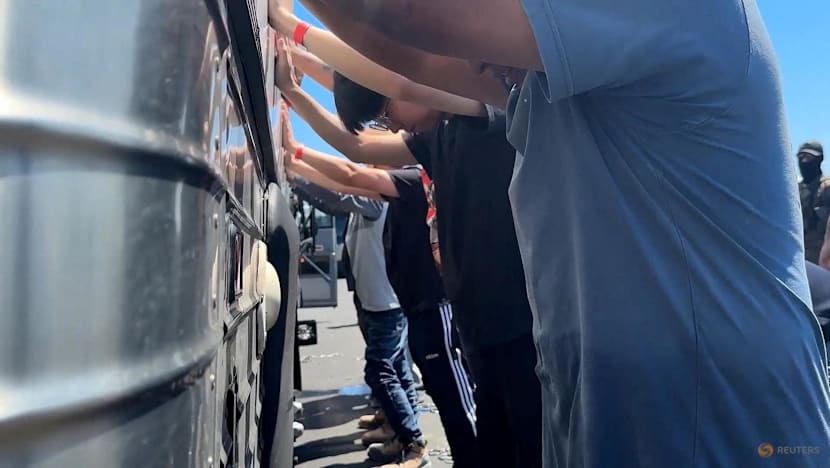South Korean President Lee Jae-myung says immigration raid targeting Korean workers could hit US investment

Detainees are made to stand against a bus before being handcuffed, during a raid by federal agents where about 300 South Koreans were among 475 people arrested at the site of a US$4.3 billion project by Hyundai Motor and LG Energy Solution to build batteries for electric cars in Ellabell, Georgia, US, on Sep 4, 2025. (Image: US Immigration and Customs Enforcement via Reuters)
SEOUL: South Korean President Lee Jae-myung said on Thursday (Sep 11) that a massive United States immigration raid on a Hyundai-LG battery factory site was "bewildering" and could have a chilling effect on future investment.
Seoul is expecting hundreds of workers detained during last week's raid in the US state of Georgia to be released from detention on Thursday and flown back to Seoul.
Lee blamed the raid on "cultural differences", saying that in South Korea, minor visa infractions by American nationals were not seen as "a serious issue".
After the US detained hundreds of workers, South Korean companies "can't help but question whether setting up a plant in the US is worth the potential risks", he said.
"This could have a significant impact on future investment decisions, particularly when evaluating the feasibility of direct operations in the US," he said.
South Korea is a staunch US security ally and major investor in America, with its top companies pouring billions into developing factories and plants in the US.
Many South Korean companies have relied on bringing in their own workforce during project development periods, with industry sources telling AFP it is common practice to use visa workarounds to bring in skilled labour and avoid project delays.
Lee said that for South Korean companies, "when setting up facilities, equipment and factories, skilled technicians are essential".
"Someone has to install the machinery, and the necessary workforce simply doesn't exist locally in the US," he said, adding that the companies had long relied on bringing in their engineers for short-term periods to train local workers.
"But now, even that basic request is being rejected," he said.
HANDCUFF SHOCK
Lee said Seoul was negotiating with Washington "to ensure that visa issuance for investment-related purposes operates normally".
This could include "securing additional quotas" or even creating a new visa category, he said, adding that he trusted the "US side will find a solution".
"But under the current circumstances, Korean companies will have little choice but to hesitate about making direct investments in the US," he added.
South Koreans made up the majority of the 475 people arrested at the Hyundai-LG battery plant under construction in Georgia last week, according to immigration agents.
The operation was the largest single-site raid conducted since US President Donald Trump launched a sweeping immigration crackdown, a top political priority since he returned to office in January.
The raid came less than a month after Trump welcomed Lee to the White House.
Images of the workers being chained and handcuffed have caused widespread alarm in South Korea, and Seoul had negotiated to make sure the workers were not handcuffed again as they were repatriated, Lee said.
The raid highlights lopsided priorities in the Trump administration, which is "actively bringing in large-scale production facilities while neglecting to train local workers", said Kim Dae-jong, professor of business at Sejong University.
"As a result, South Koreans are having to train the local workforce. Logically, the two sides' workers should be allowed to work together, not be hindered from doing so," he told AFP.
But Cho Dong-geun, professor emeritus of economics at Myongji University, warned that South Korean companies had long been aware of the visa problems.
"It is regrettable that there was no earlier intervention to address these matters in response to President Trump's anti-immigration agenda, as it should have been acted on more swiftly."
The repatriation was briefly delayed by Trump asking whether the workers should remain stateside, a Seoul foreign ministry official in Washington said.
However, South Korea's Foreign Minister Cho Hyun said that "given the workers' shock and exhaustion, it would be best for them to return home first and then re-enter the US for work later".
A Korean Air Boeing 747-8I left Seoul on Wednesday, a company representative told AFP.
Lee said the workers were "scheduled to depart the detention facility at 3pm, Seoul time (2pm, Singapore time) today".















